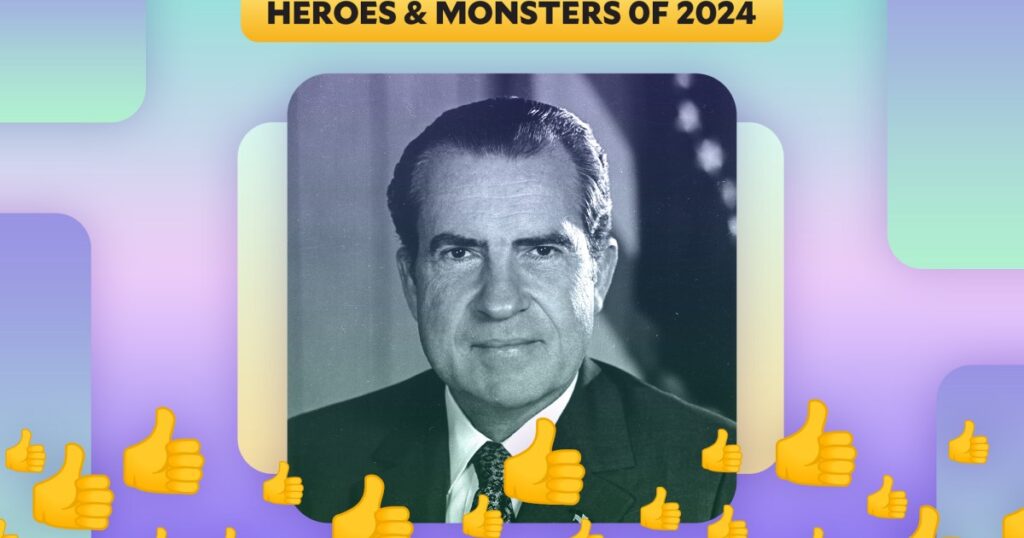Mother Jones illustration; Department of Defense
The staff of Mother Jones is, once again, rounding up the heroes and monsters of the past year. Importantly, this is a completely non-exhaustive and subjective list, giving our reporters a chance to write about something that brought joy or discontent. Enjoy.
Destroyed by Watergate and vilified for suggesting that presidents are above the law, Richard Nixon died in disgrace in 1994.
But it turns out, he was right. The 37th president was quietly but resoundingly vindicated by the Supreme Court in its Trump v. United States decision in July, when Chief Justice John Roberts declared that “the President is absolutely immune from criminal prosecution for conduct within his exclusive sphere of constitutional authority.”
“When the president does it, that means that it is not illegal.”
For Donald Trump—who was indicted for efforts to steal the 2020 election that were seemingly not part of his official duties—that ruling might not have been enough, had he not been bailed out by his November electoral victory. But Nixon could, and did, claim that his efforts to cover up the Watergate scandal were core parts of his duties. Indeed, on the so-called “smoking gun tape” from June 1972, Nixon told his chief of staff to order the CIA to tell the FBI to back off its investigation into the break-in at the Democratic National Committee headquarters because the probe would compromise national security.
That wasn’t really true. But 52 years later, the Roberts court made clear that judges should defer to presidents when their “core” powers are even arguably involved. Based on the justices’ new view of the presidency, Nixon’s infamous justifications would probably have been enough.
“Under Trump v. United States, Nixon’s statement would not amount to obstruction of justice because it related to his ‘official’ duties—that is, supervising the FBI and CIA,” legal commentator Jeffrey Toobin wrote in July.
Plus, what was the FBI even doing investigating a president for crimes? That may have flown in the 1970s, but these days, the Justice Department has a policy against prosecuting sitting presidents. And Roberts, in his ruling, warned against Justice Department activity that might cause presidents to hesitate from “bold and unhesitating” actions in exercising their vast powers. Fear that they might one day be held accountable for crimes could cause commanders-in-chief to fall prey, Roberts warned, to “undue caution.”
Take Nixon. Before Watergate, he exhibited the kind of “vigorous” decision-making that Roberts says leaders untroubled by potential prosecution can engage in. For example, Nixon fearlessly ordered the secret bombing of Cambodia without telling Congress. And he oversaw an extensive campaign of surveillance efforts aimed at suppressing domestic dissent.
By using the FBI for much of that surveillance, Nixon availed himself of the immunity that the high court has since revealed presidents enjoy when they engage in “investigative and prosecutorial decision-making”—a “special province of the Executive Branch”—where absolute immunity reigns.
As the Watergate scandal mounted, Nixon lost the vigor the Roberts court prescribes. The president was reportedly distracted, drinking heavily, and possibly suicidal. “Please don’t ever tell anyone that I cried and that I was not strong,” a sauced president supposedly told Secretary of State Henry Kissinger in 1974. He was a man left unable to “boldly and fearlessly carry out his duties”—as the Constitution turns out to demand.
Things only got worse for Nixon. After his resignation, during a televised 1977 interview with journalist David Frost, Nixon presciently explained: “When the president does it, that means that it is not illegal.” At the time, this reasoning was treated as a damning admission. Even in 2008, it was so widely accepted that Nixon was wrong that his line served as the climax of the Oscar-nominated film Frost/Nixon.
But things change. In January, Trump attorney D. John Sauer gave a “qualified yes” when asked by an appeals court judge if an ex-president would be immune from prosecution, even for having ordered SEAL Team Six to assassinate a political foe. And the argument won! “The president is now a king above the law,” Justice Sonia Sotomayor later said in a dissent. Trump has said he will nominate Sauer as his solicitor general—the Justice Department official generally responsible for arguing before the Supreme Court.
Critics have accused Roberts and the other five justices in the majority in Trump v. US of ignoring the intent of the Constitution and inventing the “absolute immunity” doctrine in order to impose an ideological preference for expanded presidential powers—or maybe just to help Trump. But these critics fail to credit Nixon with concocting similar arguments a half-century earlier.
Nixon was not a crook; he was ahead of his time. Think he was wrong? Let’s see how Trump’s second term goes.

